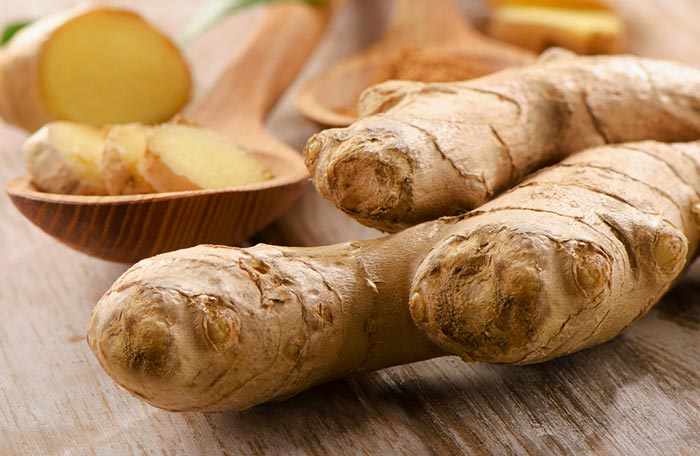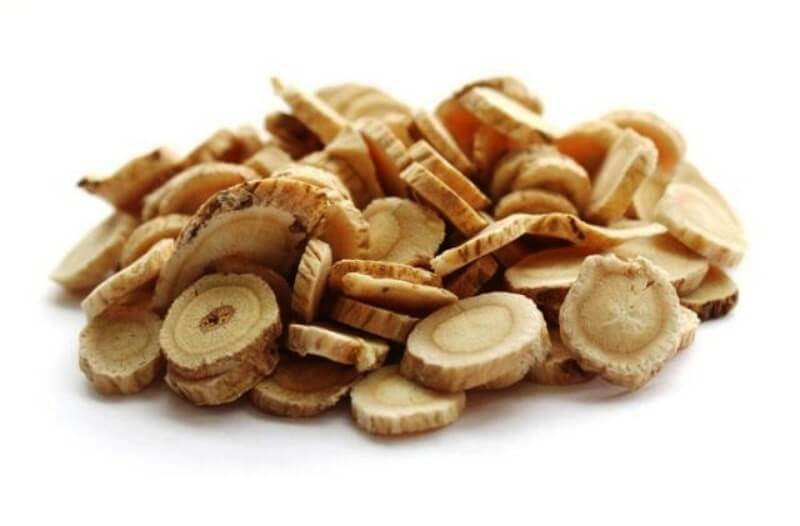Top 10 Natural Home Remedies to Boost Immunity
6. Ginger
According to Ayurveda, ginger is a good remedy to boost immunity. The warming effect of ginger on the body helps break down toxins accumulated in the body.
 This reduces the risk of infection. Ginger also improves blood circulation.
This reduces the risk of infection. Ginger also improves blood circulation.
- Drink ginger tea twice daily to boost immunity. To make the tea, boil 1 tablespoon of chopped ginger in 2 cups of water for 10 minutes. Strain, add honey and lemon juice and drink it.
- You can also include dry or fresh ginger in your cooking, or take ginger tablets after consulting your doctor.
7. Astragalus

Astragalus is a traditional Chinese herbal medicine that helps boost immunity. The immune-building and adaptogenic effects of astragalus help heighten the efficiency of virtually every component of the immune system.
- Add a handful of dried astragalus root slices to 1 quart of water. Boil it for 30 minutes, then strain it. Drink the tea daily.
- You can also take this herb in supplement form. Always consult your doctor before starting a supplement regimen.
Note: If you have an immune disorder, talk to your doctor before taking this herb.
8. Indian Ginseng (Ashwagandha)
According to Ayurveda, ashwagandha helps in the modulation of immune system reactivity and increases the red blood cell, white blood cell and platelet counts.

It has antioxidants that help in scavenging and neutralizing free radicals. This in turn helps boost immunity. Ashwagandha is available in powdered, dried or fresh root form in the market.
- Add 1 teaspoon of ashwagandha powder to a cup of water and boil it for 5 minutes. Strain, add honey and drink this tea once daily.
- Alternatively, you can take 1 tablespoon of ashwagandha root powder, along with a glass of hot milk, before going to sleep.
Note: Pregnant women should not consume ashwagandha. Plus, this herb may interfere with medicines used to treat high blood pressure because it decreases blood pressure. People with autoimmune diseases should consult their doctor before taking this herb as it may cause the immune system to become more active.
9. Vitamin D

According to a 2011 study published in the Journal of Investigative Medicine, vitamin D plays a key role in modulating the innate and adaptive immune responses.
A deficiency of vitamin D is associated with increased autoimmunity as well as increased susceptibility to infection. Hence, to boost your immunity, try to maintain the adequate amount of vitamin D in your body.
- As sunlight triggers the production of vitamin D in the body, expose your body to early morning sunlight for 10 to 15 minutes daily.
- Also, include foods high in vitamin D, such as fatty fish like salmon and mackerel, organ meats, cheese, egg yolks, some mushrooms and foods fortified with vitamin D.
- You can also take vitamin D supplements after consulting a doctor.
10. Exercise

Regular exercise – 30 minutes at least 5 days a week – can help boost your immunity. Exercise helps increase white blood cells, improve blood circulation, fight obesity and flush bacteria out of the lungs and airways. All these factors reduce your chance of getting sick frequently. Any form of exercise is better than a sedentary lifestyle.
- Walk, run or jog for 20 to 30 minutes daily.
- Enjoy bicycling and swimming a few times a week.
- Go to the gym every other day.
- Play golf, badminton, football or basketball regularly.
Note: Although exercise is good for you, be careful not to overdo it. In addition, when you are sick, avoid high-intensity workouts that can delay recovery.
Additional Tips
- You can ensure a better immunity by including plenty of servings of colorful fruits and vegetables on your plate.
- Follow a well-balanced diet with an adequate amount of vitamins A and C, zinc, selenium and iron.
- Keep a positive outlook toward life.
- Drink 8 to 10 glasses of water a day.
- Get enough sleep to help your body recover.
- Avoid stress as stress overload suppresses immune function.
- Quit smoking and avoid secondhand smoke.
- Drink less alcohol as it impairs the immune system and increases vulnerability to diseases.
- Wash your hands after using the toilet and before eating to stop the spread of infection.
- Follow proper oral hygiene.
- Stay away from people with colds or other infections and avoid crowds.
- Avoid harmful toxins as they can impair immune function and trigger the formation of cell-damaging free radicals.
- Ask your doctor about vaccinations.

Comments are closed.